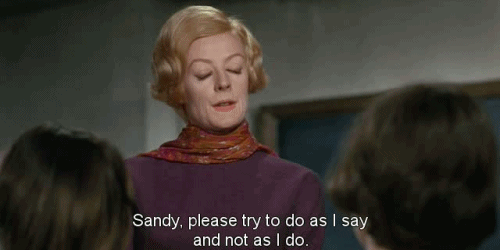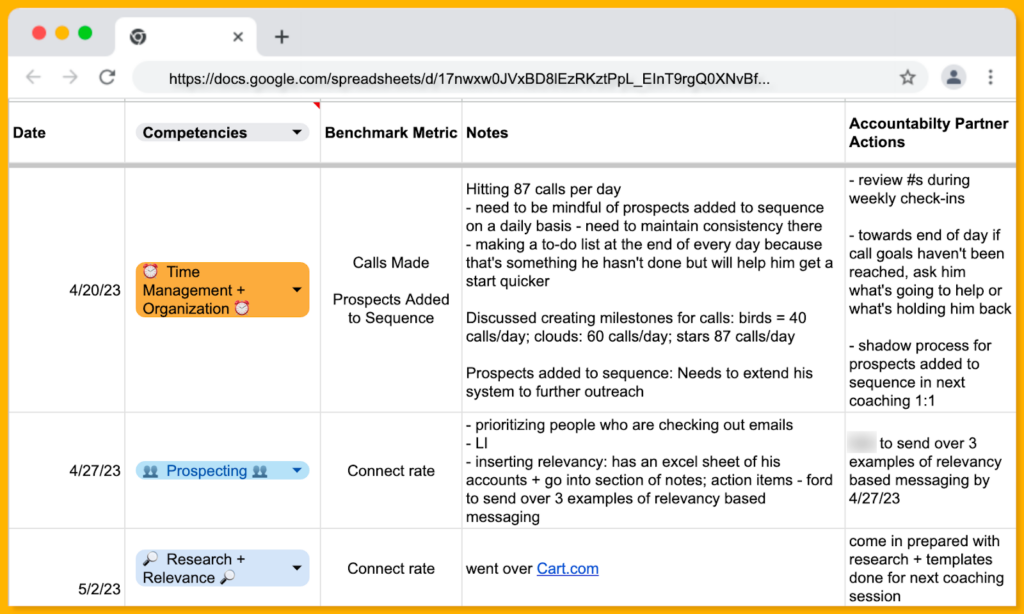24 May 2023 | Sales
What they don’t tell you when stepping into management
By Gabrielle "GB" Blackwell

If there was one thing I wish I had known when I first started in management, it’d be this – how important it is to cover your ass as a manager.
But whyyyyyy would sales managers need to cover their ass?
One-on-ones happen behind closed doors, in times where things aren’t necessarily going well. And, if you’re not showing your work, especially when your reps aren’t performing your efficacy as a manager may be called into question.
Situations that can erode others’ confidence in managers:
- Changes that significantly impact ability to hit quota – think: increase in team size, shrinking territories, decreased lead flow, etc.
- Manager and their boss haven’t established trust – i.e. when a new director comes on board or a manager moves to a new team
- Underperforming reps blame the manager for their shortcomings – this typically shows up when a rep isn’t passing while on a Performance Improvement Plan
Without having something in place to help show their work, blame can quickly fall to the manager when things go awry.
To avoid this risk, managers need to create a system that
- Helps them self-manage
- Drives accountability with reps
- Defends their work
“You do not rise to the level of your goals. You fall to the level of your systems.”

Just as reps need a system to know what tasks they need to focus on and which deals they need to follow up on, managers need a system to know what each rep is focused on for development and what follow up items need to be addressed.
To gauge if there are opportunities to improve on your system, here are some questions to ask yourself:
- What percentage of the time do I struggle remembering one-on-one follow up items with my reps?
- If my second line leader asked me to jump on a conference call right now and provide an on the spot update on the development areas for each of my reps, would I be able to with little to no prep time?
- If someone asked my rep and me what their development areas were, would we both give the same answer?
If you feel like you’re spending too much time struggling to remember your reps’ development areas, what they need to do to progress or are unsure that you and your rep are on the same page, creating a system of self-management may be an area of development (see what I did there?).
“People reflect your behavior back to you.”

If you show up unprepared to have a productive one-on-one, your reps may take that as an invitation to slack off or show up unprepared when meeting with you. But, if you’re showing up prepared to follow up on action items and identify go forward development planning, your reps will meet you where you are.
Also, if your reps aren’t showing up to your one-on-ones prepared to make the most out of them – they haven’t completed action items, shared emails or calls to get coaching on, etc – and you’re allowing them to get away with it, you’re not doing anyone any favors.
By having a system to track action items your rep should be following through on and check in items to discuss during one-on-ones, you’ll:
- Raise the level of expectation from your reps – “inspect what you expect” isn’t my favorite phrase in the world, but it has a point. If you don’t take the time to see if your reps have completed their work, they may question why they’re doing the work or just not do the work at all.
- Get ahead of problems sooner rather than later – if reps drop the ball on action items in two of the last four one-on-ones, you need to address it. This can be as simple as “in two of the last four one-on-ones, I’ve noticed you haven’t come prepared with what we discussed. What’s getting in the way?”
- Foster a culture of confidence with your reps – without a way to track where you’re going or how far you’ve come, you always risk getting lost. A system of tracking where reps are in their development, what they need to do to close their development gap, and the progress they’ve made thus far will help your rep build confidence in themselves and in their partnership with you.
“These improvements were minor, but they gave me a sense of control over my life.”

Some of the most stressful rep interactions have offered the biggest learnings as a manager. One of these stressful moments for managers can happen when a rep claims that a manager isn’t offering any coaching or development.
Oh yes – there are those reps who will throw managers under the bus, especially if they are on a Performance Improvement Plan and trending towards being exited from the business. #StressResponse4TheWin
But, with proper documentation, managers can spare themselves the agony of trying to pull themselves out from the bus their reps threw them under.
Here’s what to do:
- Keep a weekly log of competencies your reps are focused on for their development goal
- Identify the key benchmark that you want your rep to improve as part of their development
- Capture any relevant notes or observations shared by your rep
- Document action items you and your rep agree to along with due dates of when these action items should be completed
Assist: Keep your system as simple as possible. If you’re wondering how, here’s a screenshot of how I use Google Sheets to track my development work with reps:

🏀 Shoot me a response if you’d find a resource like this helpful! 🏀
“You get what you repeat.”

I used to use the coaching and development tracker only after an oh-shit moment happened, but now have pivoted to leveraging this system for every one-on-one I have.
It helps me keep track of where each of my reps are on their development journey, answer questions to higher ups more confidently and assertively about development progress and advocate for myself if and when it’s necessary.
Hopefully, today’s newsletter will encourage you to reflect on how your systems for developing your reps can serve you better or validate what you’re already doing!